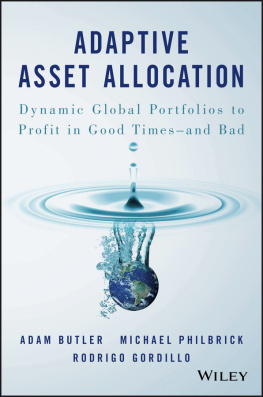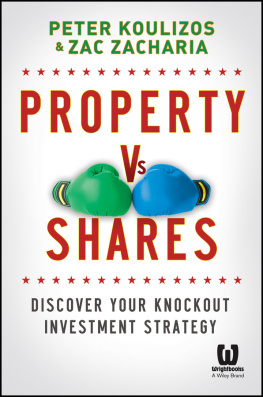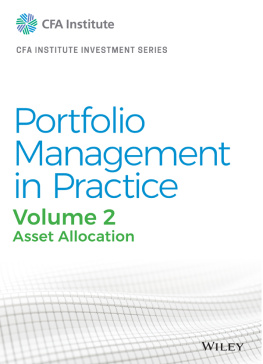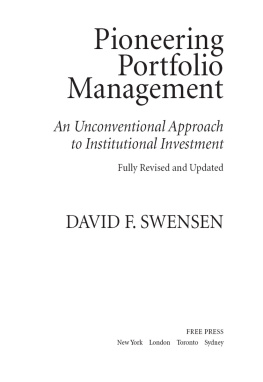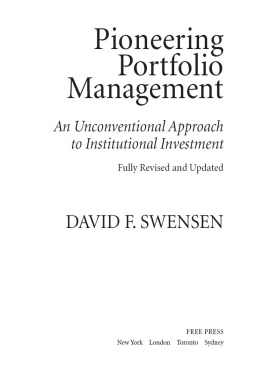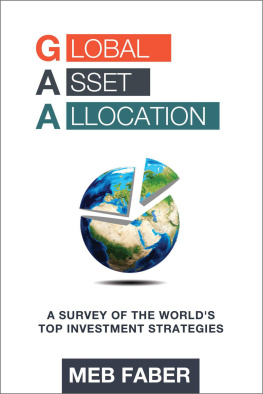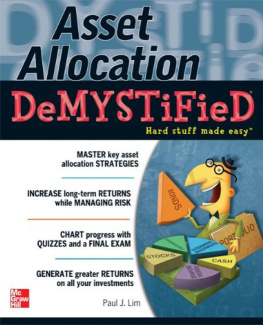
Copyright 2016 by Adam Butler, Rodrigo Gordillo, and Michael Philbrick. All rights reserved.
Published by John Wiley & Sons, Inc., Hoboken, New Jersey.
Published simultaneously in Canada.
No part of this publication may be reproduced, stored in a retrieval system, or transmitted in any form or by any means, electronic, mechanical, photocopying, recording, scanning, or otherwise, except as permitted under Section 107 or 108 of the 1976 United States Copyright Act, without either the prior written permission of the Publisher, or authorization through payment of the appropriate per-copy fee to the Copyright Clearance Center, Inc., 222 Rosewood Drive, Danvers, MA 01923, (978) 750-8400, fax (978) 646-8600, or on the Web at www.copyright.com. Requests to the Publisher for permission should be addressed to the Permissions Department, John Wiley & Sons, Inc., 111 River Street, Hoboken, NJ 07030, (201) 748-6011, fax (201) 748-6008, or online at http://www.wiley.com/go/permissions.
Limit of Liability/Disclaimer of Warranty: While the publisher and author have used their best efforts in preparing this book, they make no representations or warranties with respect to the accuracy or completeness of the contents of this book and specifically disclaim any implied warranties of merchantability or fitness for a particular purpose. No warranty may be created or extended by sales representatives or written sales materials. The advice and strategies contained herein may not be suitable for your situation. You should consult with a professional where appropriate. Neither the publisher nor author shall be liable for any loss of profit or any other commercial damages, including but not limited to special, incidental, consequential, or other damages.
For general information on our other products and services or for technical support, please contact our Customer Care Department within the United States at (800) 762-2974, outside the United States at (317) 572-3993 or fax (317) 572-4002.
Wiley publishes in a variety of print and electronic formats and by print-on-demand. Some material included with standard print versions of this book may not be included in e-books or in print-on-demand. If this book refers to media such as a CD or DVD that is not included in the version you purchased, you may download this material at http://booksupport.wiley.com. For more information about Wiley products, visit www.wiley.com.
Library of Congress Cataloging-in-Publication Data
Names: Butler, Adam, 1975 author. | Gordillo, Rodrigo, 1980 author. | Philbrick, Michael, 1967 author.
Title: Adaptive asset allocation : dynamic global portfolios to profit in good timesand bad / Adam Butler, Rodrigo Gordillo, Michael Philbrick.
Description: Hoboken, New Jersey : John Wiley & Sons, Inc., 2016. | Includes bibliographical references and index.
Identifiers: LCCN 2015039980 | ISBN 9781119220350 (cloth) | ISBN 9781119220398 (ePDF) | ISBN 9781119220374 (ePub)
Subjects: LCSH: Portfolio management. | Investments.
Classification: LCC HG4529.5 .B87 2016 | DDC 332.6dc23 LC record available at http://lccn.loc.gov/2015039980
Cover Design: Wiley
Cover Image: Earth dropping into water, courtesy of the authors
To our family, friends, colleagues, and clients who supported and enabled us: Thank you.
Acknowledgments
To those who matter most, Lauren, Ava, Oliver, and Lucy, thank you for your patience with this project. Also, a special thank you to David Varadi, who inspired many of the concepts in this book, and Doug Hole, without whose support and encouragement this book could never have happened. Lastly, thanks to David Gimpel, editor extraordinaire, who shepherded this project to completion through sheer force of will.
Adam Butler
To my family at homeSharon, Mackenzie, and Meaganand my family at work, thank you. Without your support, endless encouragement, commitment, and most of all, patience, none of this would be possible.
Mike Philbrick
To my wife, Rory, and my two children, Isobel and Allegra, I would not be able to accomplish anything worth doing in my professional life without your incredible and unwavering support. Also, to my business partners and mentorsMike and Adamthank you for allowing me to contribute and be part of this amazing project.
Rodrigo Gordillo
Part I
The Philosophy of Successful Investing
Eleanor Roosevelt is credited with the timeless insight that we would be wise to learn from the mistakes of others because we don't live long enough to make them all ourselves. Truly, too few of us take this to heart, preferring to ignore the wisdom of experience and learn the same lessons over and over the hard way.
Count us among this group.
Knowing what we know now about human nature and psychology, we are no longer surprised by our own frequent episodes of hubris, attribution bias, various logical atrocities, or any number of other equally destructive cognitive foibles. Nor are we particularly surprised by the occasional but negative consequences that inevitably arise from these shortcomings. They are a fact of life for all humans, and we come by them honestly. These genetic qualities were, after all, forged in the crucible of a dark and dangerous past where careful and unemotional problem solving was necessarily subordinated to activities which furthered our need to feed and shelter ourselves, and avoid predators.
Unfortunately, many of the instincts and heuristics, which served us so well on the ancient veldt, work at cross-purposes to our long-term goals in modern society. It is fortunate then that, as we will explore at length in the first section of this book, there are ways to short-circuit the destructive behaviors of our lizard brains. But the first step is acknowledgment.
One psychological quality that has endured through the ages and continues to serve us well today is our ability to learn from mistakes. In fact, for many of us this is the only way we learn. And when we say learn, what we really mean is change our behavior. This is an important distinction, because if a consequence doesn't cause you to change your behavior then you haven't really learned a lesson.
The hard truth is that most often, change stems from a cycle of crisis leading to necessity, which, in turn, provides the requisite motivation. Recall the smoker who finally quits when he is diagnosed with lung cancer or the alcoholic who must hit rock bottom before abandoning the bottle. A person must acutely feel the urgency of change in order to muster the extraordinary effort and courage that it takes to become a new person with different beliefs and behaviors.
Wethe authors and members of our executive teamhave abundant war wounds and scars from battles with the market, which remind us daily of the consequences of failing to manage our propensity for economically destructive behavior. If you require a case-in-point, consider my (Adam's) first experience on a trading floor after graduating from university with a BA in psychology. In my first 17 months, I earned over $2.5 million in profits for my proprietary trading desk, only to lose $4 million in the eighteenth month. This was a lesson in itself, but it was galvanized by a real consequence, which affected me directly: getting fired.
On being dismissed, it was easy to blame bad luck, poor supervision, the Russian debt default, the collapse of Long-Term Capital Management, and the Asian currency crisis. But with the benefit of perspective, it is impossible to avoid the fact that naivety and hubrisqualities of my character at the timecontributed far more to my failure than the environment in which I operated.
Next page
